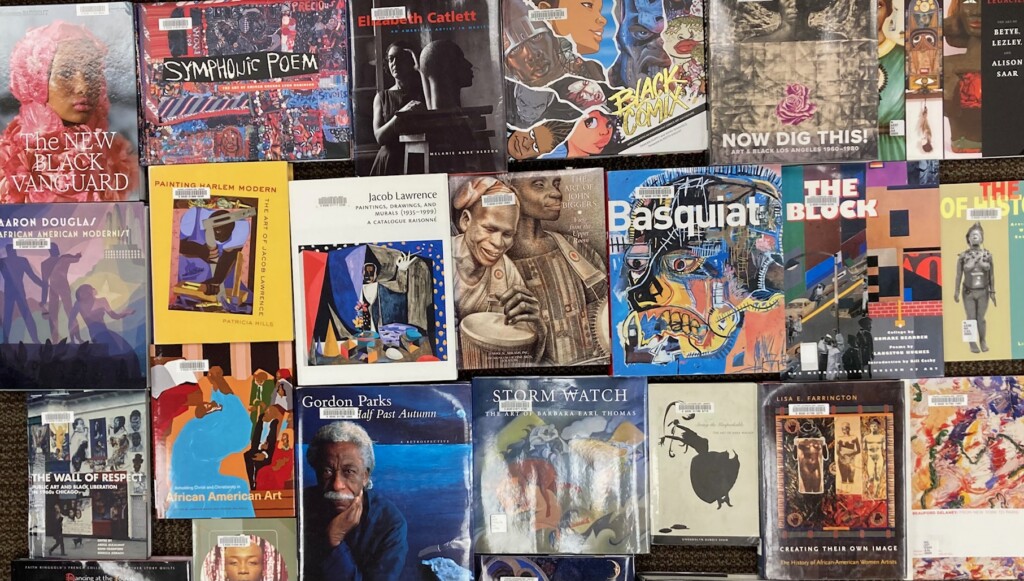Page 89 • (3,733 results in 0.051 seconds)
-
shop features three blends and four brew methods, spotlighting a new local or regional roaster each month. Everything in the business model is precise. Lauren (Buchholz) Reese ’09 said she and her co-owners measure water and coffee beans down to one-tenth of a gram. They even tested a variety of lid types before picking the perfect one. “There aren’t very many,” Reese said, noting that they landed on one that offers more “nose room” and mirrors the experience of drinking out of a mug. Before
-

. The Black artists’ work in this exhibit of library books display the range of topics noted above and additional topics such as slavery, Black humanity, and Black pride expressed in a variety of styles and methods. Background about why we celebrate Black History Month. The online exhibit Black@PLU traces the stories of Black students, staff, faculty, and organizations that have shaped the history of Pacific Lutheran University. Black@PLU is a PLU Archives and Special Collections digital exhibit
-
Scott Rogers, PhDDepartment of EnglishWordPress for Blogs and Portfolios Scott Rogers at desk in office. (PLU Photo/John Froschauer) WordPress Product Website: wordpress.com Cost: FreeScott Rogers is an assistant professor in the English Department and primarily teaches courses related to writing, research, and professional communication. Because Composition Studies is so closely tied to the classroom, he spends a lot of time thinking about pedagogy, especially the unique challenges presented
-

insightful answers,” Heath writes in the class syllabus. “Although we will be using some scientific methods of inquiry and exploring scientific ideas, this is not a science course. As we work to design our starship, we will find that many of the lessons we learn can be directly applied on Earth.”In the first few weeks of class, Heath’s goal is to convince students that they are actually building a starship. It’s the most important part of the course because the starship concept forces students to think
-
) January of Junior Year General Ed***One course toward fulfillment of General Education Requirements (4 semester credits) on campus or Study Away Spring of Junior Year NURS 311Patho/Pharm II (2) NURS 314Care of Chronic Conditions (3) NURS 315Psych/Mental Health (2) NURS 316Clinical Practicum II (5) NURS 317Theory & Evidence (1) NURS 318Research Methods (2) NURS 319Healthcare Technology (1) Fall Entry - Senior Year Fall of Senior Year NURS 401Care of Complex Conditions (3) NURS 402Patho/Pharm III (2
-
Distributive Core: Ways of Being and Knowing Students take one course from each of the following categories; students must take these courses from different programs to ensure they encounter multiple methods and practices during their undergraduate career. Creative Expression (CX) Engaging the Natural World (NW) Interpreting Text (IT) Examining Self and Society (ES) Exploring Values and Worldviews (VW) Quantitative Reasoning (QR) Integrative Learning: The Culminating Experience Students will participate in
-
Add Edit Remove Back New Delete Student Instructions Training Video Human Participants Review Board Site Menu Home Students Step 1: Do you need review? Step 2: Consult Step 3: Online CITI training Step 4: HPRB basics Step 5: Methods issues Step 6: Review time Step 7: Submit Proposal Step 8: Respond to HPRB Step 9: Your responsibilities Faculty et al. PLU Researchers Instructors Faculty Supervisors Non-PLU Researchers Forms & Templates Mentor Instructions Frequently Asked Questions Meet the HPRB
-
Remove Back New Delete Unit Designates Training Video Human Participants Review Board Site Menu Home Students Step 1: Do you need review? Step 2: Consult Step 3: Online CITI training Step 4: HPRB basics Step 5: Methods issues Step 6: Review time Step 7: Submit Proposal Step 8: Respond to HPRB Step 9: Your responsibilities Faculty et al. PLU Researchers Instructors Faculty Supervisors Non-PLU Researchers Forms & Templates Mentor Instructions Frequently Asked Questions Meet the HPRB Meeting Schedule
-

Biography Paul Sutton teaches sociocultural foundations of education, secondary humanities methods, and secondary literacy courses as well as various seminar courses in the undergrad and graduate-level teacher education programs. He is also the co-chair of the university Common Reading Program and is an active parent and community volunteer in his local school district where he sits on several committees to inform district policy and practice. He maintains an active and diverse publication and
Area of Emphasis/Expertise -
of Kansas in 1981, with a major in special education and a minor in language development. He joined the PLU faculty in 1981 and since 1994 has held the rank of professor. Reisberg has contributed to the literature in special education by focusing on topics that can positively impact the lives of students with academic and behavior difficulties, among them classroom management, technology-based instructional methods, and para-educator training. He has held many roles in the School of Education and
Do you have any feedback for us? If so, feel free to use our Feedback Form.


